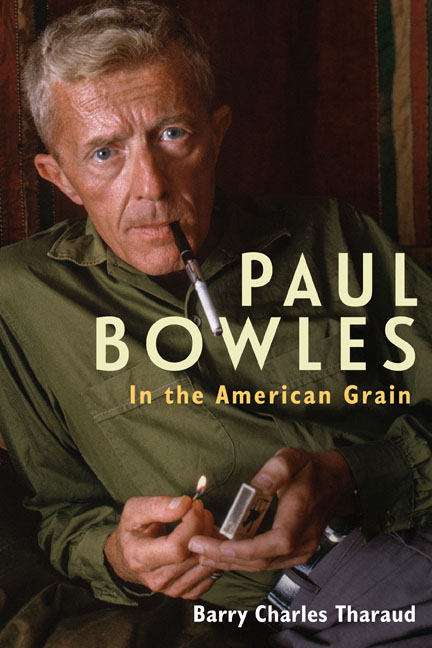Book contents
- Frontmatter
- Contents
- Preface
- Acknowledgments
- Abbreviations
- Introduction: Paul Bowles as a Canonical Writer
- 1 Paul Bowles on Intercultural Understanding: Too Far from Home
- 2 The Discovery of Existence: Without Stopping
- 3 Emersonian Shadows
- 4 Culture and Existence in Bowles’ Short Fiction
- 5 Gide and Bowles in North Africa: The Sheltering Sky
- 6 Language, Noise, Silence: Self and Society in Let It Come Down
- 7 The Spider’s House: The Social Construction of Reality
- 8 Existence and Imagination: Up Above the World
- 9 The Letters: In Touch
- Conclusion
- Bibliography
- Index
Introduction: Paul Bowles as a Canonical Writer
Published online by Cambridge University Press: 24 November 2020
- Frontmatter
- Contents
- Preface
- Acknowledgments
- Abbreviations
- Introduction: Paul Bowles as a Canonical Writer
- 1 Paul Bowles on Intercultural Understanding: Too Far from Home
- 2 The Discovery of Existence: Without Stopping
- 3 Emersonian Shadows
- 4 Culture and Existence in Bowles’ Short Fiction
- 5 Gide and Bowles in North Africa: The Sheltering Sky
- 6 Language, Noise, Silence: Self and Society in Let It Come Down
- 7 The Spider’s House: The Social Construction of Reality
- 8 Existence and Imagination: Up Above the World
- 9 The Letters: In Touch
- Conclusion
- Bibliography
- Index
Summary
FROM 2003 TO 2005 I SERVED as a Fulbright professor in Morocco, where I lived for a year in Tétouan and a year in Tangier. Before leaving the States, a friend and colleague suggested I should read Paul Bowles, whom I had never read. At the time, I had recently retired from a tenured career of teaching literature in the Colorado trustee system of colleges, and twenty-seven years earlier I had emerged from graduate school as an Americanist, although during most of my career I taught world literature or comparative literature. In retrospect it seems astonishing that I could have been so ignorant of an important twentieth-century American literary figure, and of course the blame is mine—but not all of the blame. Bowles had an important cult status in the 1950s and 1960s, but during the time I was in graduate school, his works were generally out of print although he had begun translating the oral tales of Moroccan storytellers from Moghrebi Arabic into English. It was in the 1980s and 1990s that his work began to be republished in “little presses” and a gradual resurgence of his work occurred, so that in 1998 Millicent Dillon's You Are Not I: A Portrait of Paul Bowles begins with the statement, “In the past decade, since Paul Bowles has become an international legend […]” (Dillon, ix). The Bowles resurgence was crowned by the 2002 twovolume Library of America edition of Bowles’ works, edited by Daniel Halpern. But even today Bowles’ works continue to be considered noncanonical in many quarters. The last time I looked, the then-latest 2007 edition of the multivolume Norton Anthology of American Literature— well over ten thousand pages of text and well over one hundred pages of bibliography—made no mention whatsoever of Paul Bowles, not even in the index or summaries of periods. I suppose this might be the basis for a good argument against canons, but part of my argument in the present volume is that Bowles is indeed canonical.
- Type
- Chapter
- Information
- Paul BowlesIn the American Grain, pp. 1 - 16Publisher: Boydell & BrewerPrint publication year: 2020



